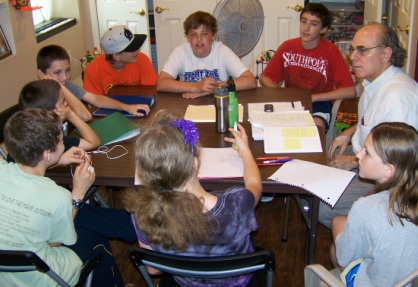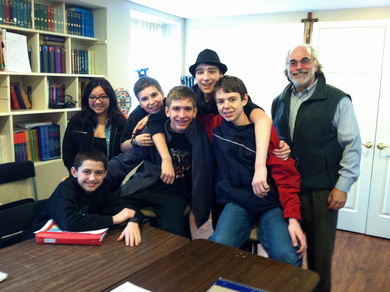Philosophy For Children with Rich Piscopo

"You can't force a plant to grow by tugging on its leaves!"
This saying pretty much sums up what I (and Philosophy for Children) are all about.
It implies that you can't force a child to learn. You must prepare and cultivate the learning environment if you want your child to grow. An atmosphere of trust must be fostered where the child's ideas are encouraged and not judged. Open and free inquiry will then flourish. The setting is now ripe to develop critical and creative thinking skills. In our newly formed community of inquiry, experimentation, discovery and wonder prevail.
These are the main tenets of the Philosophy for Children pedagogy.
I received my Masters of Arts Degree in this very effective and proven Socratic teaching method in 1982 from the Institute for the Advancement of Philosophy for Children, located at Montclair State University, Montclair, New Jersey. I had the rare and great privilege of studying directly under the I.A.P.C.'s founder and Executive Director, Professor Matthew Lipman. Dr. Lipman brought his Philosophy for Children curriculum to Montclair State University from Columbia University where he was a full professor of Philosophy.
I received my Bachelor of Arts Degree in Religion from Drew University, located in Madison, New Jersey.
Besides teaching, I have many years of experience as a mental health counselor. I coupled these two skills, along with a Teacher of the Handicapped Certificate, to teach as a Special Education teacher to Emotionally Disturbed adolescents in Newark. I now own and run a small tutoring business.
In my spare time, I study and teach Tai Chi and meditation. I am certified in Medical Qi Gong from the Eastern School of Acupuncture,
located in Montclair, New Jersey.
We're all on this journey of discovery. Let's share it together!
Rich Piscopo, MA
This saying pretty much sums up what I (and Philosophy for Children) are all about.
It implies that you can't force a child to learn. You must prepare and cultivate the learning environment if you want your child to grow. An atmosphere of trust must be fostered where the child's ideas are encouraged and not judged. Open and free inquiry will then flourish. The setting is now ripe to develop critical and creative thinking skills. In our newly formed community of inquiry, experimentation, discovery and wonder prevail.
These are the main tenets of the Philosophy for Children pedagogy.
I received my Masters of Arts Degree in this very effective and proven Socratic teaching method in 1982 from the Institute for the Advancement of Philosophy for Children, located at Montclair State University, Montclair, New Jersey. I had the rare and great privilege of studying directly under the I.A.P.C.'s founder and Executive Director, Professor Matthew Lipman. Dr. Lipman brought his Philosophy for Children curriculum to Montclair State University from Columbia University where he was a full professor of Philosophy.
I received my Bachelor of Arts Degree in Religion from Drew University, located in Madison, New Jersey.
Besides teaching, I have many years of experience as a mental health counselor. I coupled these two skills, along with a Teacher of the Handicapped Certificate, to teach as a Special Education teacher to Emotionally Disturbed adolescents in Newark. I now own and run a small tutoring business.
In my spare time, I study and teach Tai Chi and meditation. I am certified in Medical Qi Gong from the Eastern School of Acupuncture,
located in Montclair, New Jersey.
We're all on this journey of discovery. Let's share it together!
Rich Piscopo, MA
Facilitator NotesIf one is a person of conscience and would like the establishment of a rational society, then one would presumably like reason to prevail among human beings. Where does one acquire the skills of reasoning? Ostensibly, one would think these skills could be acquired in our public school system. As homeschoolers, one sees that this is clearly not the case. "Teaching to the test" and conformist, mundane thinking rules public education today. One is hard pressed to find creative, "outside the box" thinking. If your child is sensitive and imaginative, there is no forum in that system where your child can be heard -- they simply are not seen.
To those who value original thinking and the principles of reason, where does one turn? One turns to a tested, inspired, and original curriculum designed specifically to teach reasoning and creative thinking. Dr. Matthew Lipman's Philosophy for Children curriculum was created by Dr. Lipman at his Institute for the Advancement of Philosophy for Children. Through Socratic dialogue and by fostering a community of inquiry where curiosity and questioning are encouraged, reasoning skills are honed. The teacher is a facilitator, not a dictator. The class is a democratic setting where all have equal say (we sit in a circle!), and all are learning together. |
Course DescriptionThe methodology utilized in this course is based upon the pedagogy
developed by Dr. Matthew Lipman in his Philosophy for Children curriculum. It is referred to as the Socratic Method, or Dialectic. It is based on a logical method of questioning which Socrates further developed and made famous. One of the benefits of this method is that it empowers the student. The student is treated with respect and it is presupposed that the student's ideas are worthy of examination. This approach is student-centered, not teacher-centered. In this manner, the student gains confidence in his perceptions, thereby engendering empowerment. The teacher/facilitator creates the conditions for this pouring forth of ideas by fostering an atmosphere of trust. It is within this non-judgmental learning environment where the student feels free to discover and experiment with new ideas. For a full description of methodology and skills attained, including state standards met through the course, see the printable pdf below:
| ||||||
Mosaic Freeschool P4C Classes
From May 2011 - April 2014, Mosaic Freeschool facilitated multiple P4C classes for elementary and middle school students (ages eight to fourteen). Currently, we are only accepting indications of interest for future classes. To be placed on the notification list, please email [email protected] with your first and last name, and name(s) and age(s) of all interested students. We will be happy to contact you should the Philosophy for Children program be added back to our course line-up.
Mosaic Freeschool has no financial interest in the P4C program.
Mosaic Freeschool has no financial interest in the P4C program.


